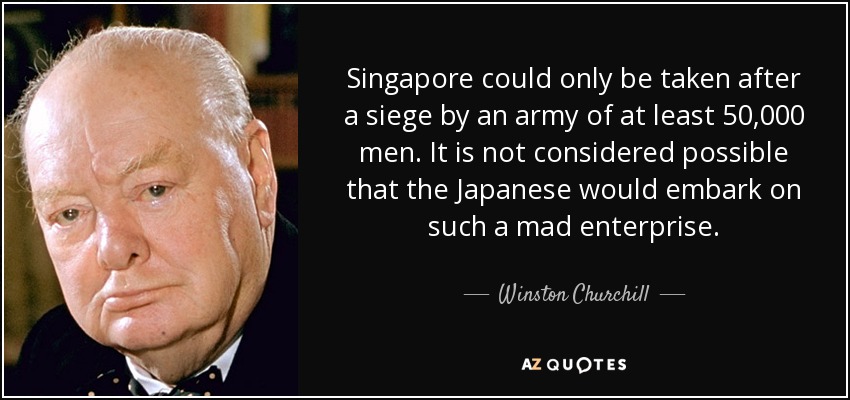February 1942
Fortress Singapore would never fall to the Japanese. Why, it was impregnable! His Majesty's Naval Base at Sembawang and its formidable guns facing south deterred an attack by sea. In the north, dense jungle blocked the passage of any army.
And if that weren't enough, almost 100,000 British, Australian, Canadian, Indian and Malayan troops are stationed on the island, ready to fight off any invader. What could go wrong?
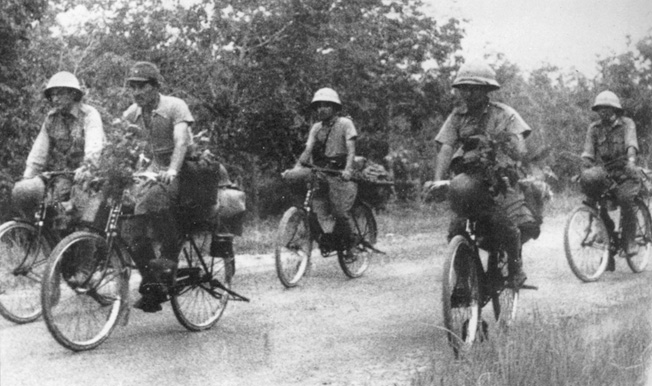 Photo from Warfare History Network.
Photo from Warfare History Network.
Oh...
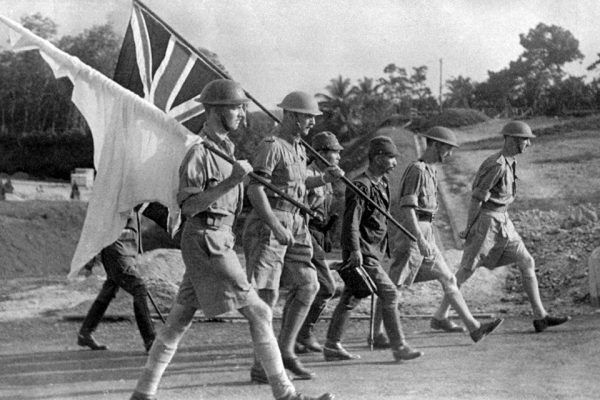 Photo from HistoryNet.
Photo from HistoryNet.
Well...
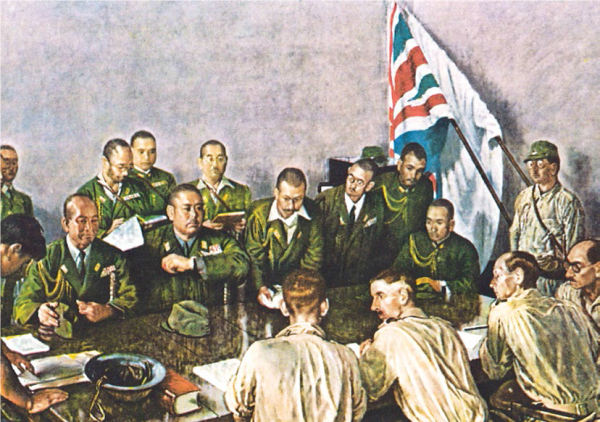 Pic from NLB.
Pic from NLB.
That's probably not good.
Who's to blame for Singapore's fall?
British General Arthur Percival, the man who commanded the armed forces defending Singapore from the Japanese, gets a lot of blame for surrendering so quickly.
Post-war analysis shows that while the Allies were running out of supplies, so were the Japanese.
But Percival had no way of knowing at the time.
Then British Prime Minister Winston Churchill called it "the worst disaster in British military history". But if Churchill wanted to blame someone for the defeat at Singapore, he need only to look into a mirror.
[related_story]
The Singapore Strategy
The defeat is seen today as poor planning by our former colonial overlords. But the British had long prepared for a Japanese attack.
In 1905, the fledgling Empire of Japan defeated Tsarist Russia, shocking the world.
During World War One (WW1), the Japanese allied themselves with the Russians, French and British, seizing German territories in East Asia such as Tsingtao (Qingdao today).
Japan's ambitions worried the British, so they hatched a plan to counter the threat.
Singapore was chosen as the site for a major naval base in the Far East, where the Royal Navy could intercept a marauding Japanese fleet. This was known as the Singapore Strategy.
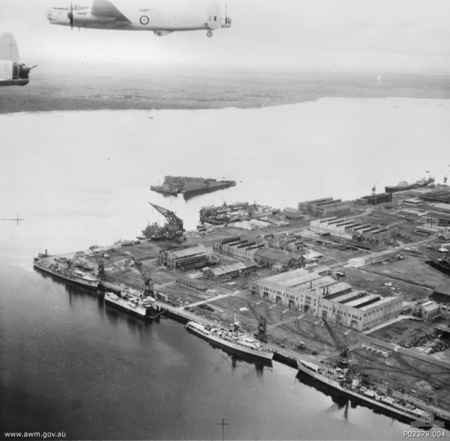 Singapore Naval Base, 1953. Pic from Wikipedia.
Singapore Naval Base, 1953. Pic from Wikipedia.
First Lord of the Admiralty
This suited a young Winston Churchill. In 1911 as a member of the Liberal party, he was appointed First Lord of the Admiralty, the political head of the Royal Navy. In this role, he pushed the government to increase the navy's budget.
Churchill was First Lord when WW1 broke out in 1914, but resigned in 1915 after planning the disastrous botched invasion of Gallipoli, Turkey.
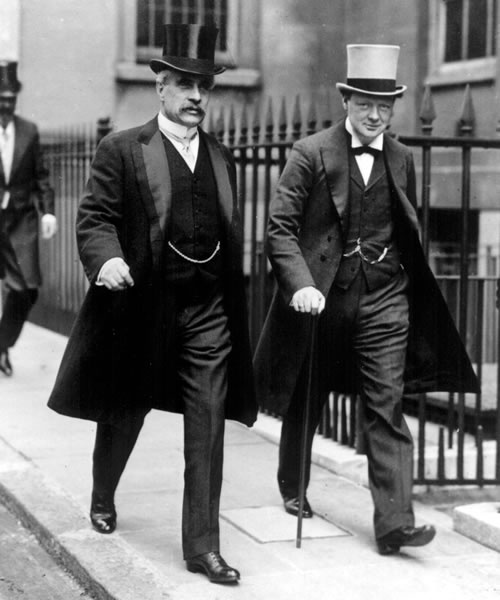 A young First Lord Churchill with Canadian PM Robert Borden in 1912. Pic from NZ History.
A young First Lord Churchill with Canadian PM Robert Borden in 1912. Pic from NZ History.
After WW1, the US, the U.K. and Japan realised how important navies were and started an "arms race" of building more and more ships. To stop it from getting out of hand, they signed the Washington Naval Treaty in 1922.
This limited the number of battleships they could build to a 5:5:3 ration for the U.S., UK and Japan.
But as the Western nations already had a huge advantage in industrial capacity, this gave Japan time to catch up and helped more than it hurt.
Chancellor of the Exchequer
By 1924, Churchill had defected from the Liberals and rejoined the Conservatives, who won the general election.
He was given the important post of Chancellor of the Exchequer, the U.K.'s equivalent of a Minister for Finance. He would set budget priorities for the new government.
Despite being an ex-Admiralty man, Churchill made deep cuts in the Navy to finance his spending plans, confident that the Washington Treaty would keep Japan in check.
Not only did the Royal Navy shrink drastically, Churchill also urged the government to postpone its plans for fortifying and upgrading the naval base in Singapore, saying:
"Why should there be a war with Japan? The Japanese are our allies. I do not believe there is the slightest chance of war (with Japan) in our lifetime."
According to the biography Gandhi and Churchill by Arthur Herman:
"His strategic miscalculations weakened the Royal Navy's ability to patrol the globe, including the Pacific, and left Singapore virtually defenceless with fatal consequences later. If any single person can be blamed for the collapse of Britain's East Asia empire in 1942, and for allowing Japan to advance to the gates of India, it is Chancellor Winston Churchill."
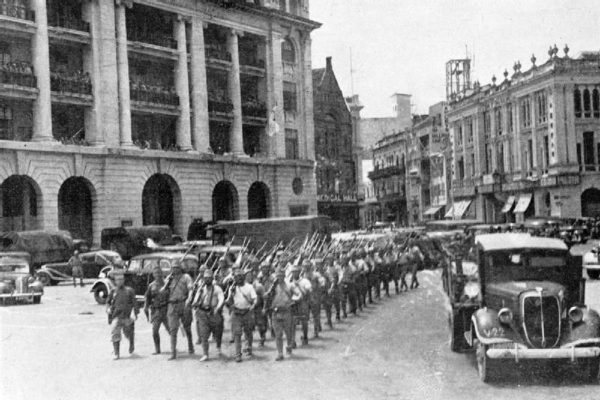 Victorious Japanese soldiers marching through Fullerton Square. Pic from Wikipedia.
Victorious Japanese soldiers marching through Fullerton Square. Pic from Wikipedia.
Wartime Prime Minister
When World War Two began, Churchill was probably wishing that he hadn't made those naval cuts all those years ago.
As Prime Minister, his navy was tied up in the Atlantic Ocean, battling German submarines and guarding supply fleets from the U.S..
This left few resources to protect Britain's colonies in the Far East.
When Singapore fell, Churchill was shocked.
Although the situation wasn't perfect, they still had enough men to put up a good fight. But he hadn't counted on Percival to surrender so quickly.
According to Churchill by Roy Jenkins, he said:
"We had so many men in Singapore, so many men. They should have done better."
The man who valued Britain's colonial empire so much was arguably to blame -- in part -- for the loss of Britain's "Crown Jewel" in Southeast Asia. Churchill died in January 1965, a few short months before Singapore gained its independence.
Top image from AZ Quotes.
Here are some totally unrelated but equally interesting stories:
HDB things we are so used to now but will probably not miss in 10 years’ time
Which of these cool young Singaporeans would you want your kid to grow up to be?
If you like what you read, follow us on Facebook, Instagram, Twitter and Telegram to get the latest updates.
